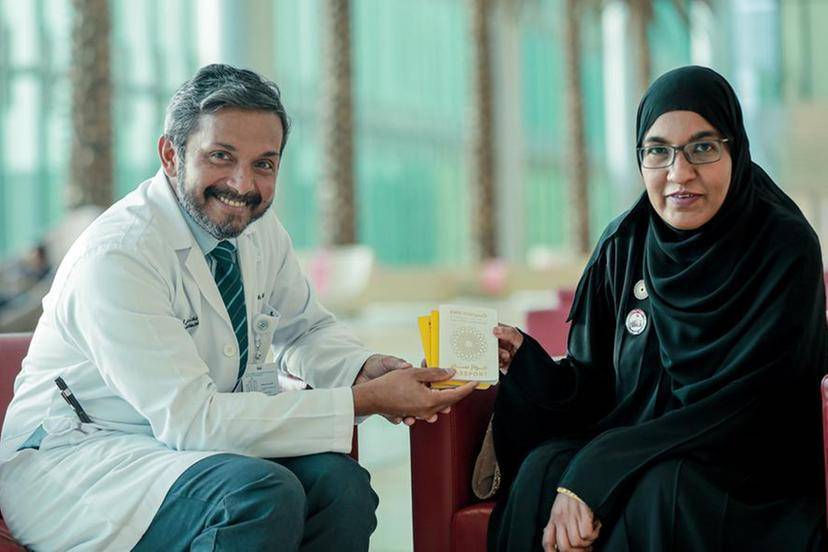Having already endured years of loss of balance resulting in having to use a cane to walk, she had all but resigned herself to her condition…reports Asian Lite News
After a decade of seeing her balance deteriorate, a sister’s urge to get a second opinion for ongoing health issues led to the diagnosis of multiple sclerosis (MS), an effective treatment, and a new lease of life.
Multiple sclerosis is an autoimmune condition that affects the brain and spinal cord, and, according to a scientific study conducted in the UAE, there is a growing incidence of MS in the region.
Ameena had been living with undiagnosed MS for many years, working as a school administrator, struggling with organizational and clerical duties. Having already endured years of loss of balance resulting in having to use a cane to walk, she had all but resigned herself to her condition.
“It was about 10 years’ back, when I first observed some changes in my everyday movements. I tried to distract myself and focus on my work as a school administrator; as long as I was busy, I was okay,” she explains.
It came to a point that she was unable to walk even 200 meters without assistance or asking her colleagues for help. Even after seeking medical assistance, nothing seemed to work. It was only when her sister recommended that she visit Cleveland Clinic Abu Dhabi, a Mubadala Health partner, that she took her condition more seriously.
Dr. Anu Jacob, Director of Multiple Sclerosis and Autoimmune Neurology at Cleveland Clinic Abu Dhabi, explains:
“It was no surprise to me that Ameena was not diagnosed, despite 10 years’ of symptoms. Not every person with MS will have typical symptoms. Some will experience many seemingly unrelated and bizarre health problems that confuse doctors. Importantly, not every patient will be able to explain their symptoms to the doctors. Some patients will just ignore symptoms or not seek help; they just cope with their difficulties. But careful history-taking and attention to detail led us to the conclusion that she may have MS, primarily in the spinal cord,” he says.
There are two stages of the disease, namely relapsing and progressive. The relapsing stage lasts for many years and has effective treatment options, but in the progressive stage, the patient’s condition, especially mobility, gradually deteriorates and becomes more difficult to treat.
“Ameena’s long history of symptoms and gradual deterioration made progressive MS more likely, but I felt it important, particularly with the unclear past history, that we offer her our best treatments,” he adds.
Convincing Ameena to alter her course of treatment took some effort, but a cautionary note from the doctor, saying: “You can decline the (new) treatment and expect the wheelchair to be your best buddy, or commit to it and, if you are lucky, start running”, persuaded her to start the new treatment. “I told the doctor, I don’t want to run, but I want to fly!” she laughed.
Determined to make this work, and to also make her dream of visiting the Expo 2020 Dubai and covering all pavilions on foot a reality, Ameena committed to her new regime. She is proud to say that she has fulfilled her dream: “It was something else, to be able to walk without any support, any assistance. All of this has been made possible by the caring staff at Cleveland Clinic Abu Dhabi,” she says.
Dr. Anu Jacob says in conclusion: “Ameena’s case is not an exception, we regularly see patients who have delayed diagnosis of MS. People need to be aware of the possibility of MS. We also need to believe that multiple sclerosis is treatable and not a terminal illness.”
But he cautions: “Sometimes, the opposite happens! Patients who do not have MS get labelled with MS and are put on the wrong medicines. It is important to listen carefully to patients, sift through the very many symptoms, and examine thoroughly before reaching a conclusion. Our patients deserve personalized treatment.
“It is possible to live a normal, or near normal, life with MS. I feel happiest when my MS patients tell me that they had almost forgotten about their MS until the hospital reminded them about their appointment with me!”
The Multiple Sclerosis Program at Cleveland Clinic Abu Dhabi’s Neurological Institute takes a ‘patient-first’ approach and is one of the largest and most comprehensive in the region. The team’s mission is to work together with each patient and their family to ensure accurate and timely diagnosis. A state-of-the-art treatment plan and long-term management support are provided to each patient.
ALSO READ-School drop out and mom at the centre of colourful universe
